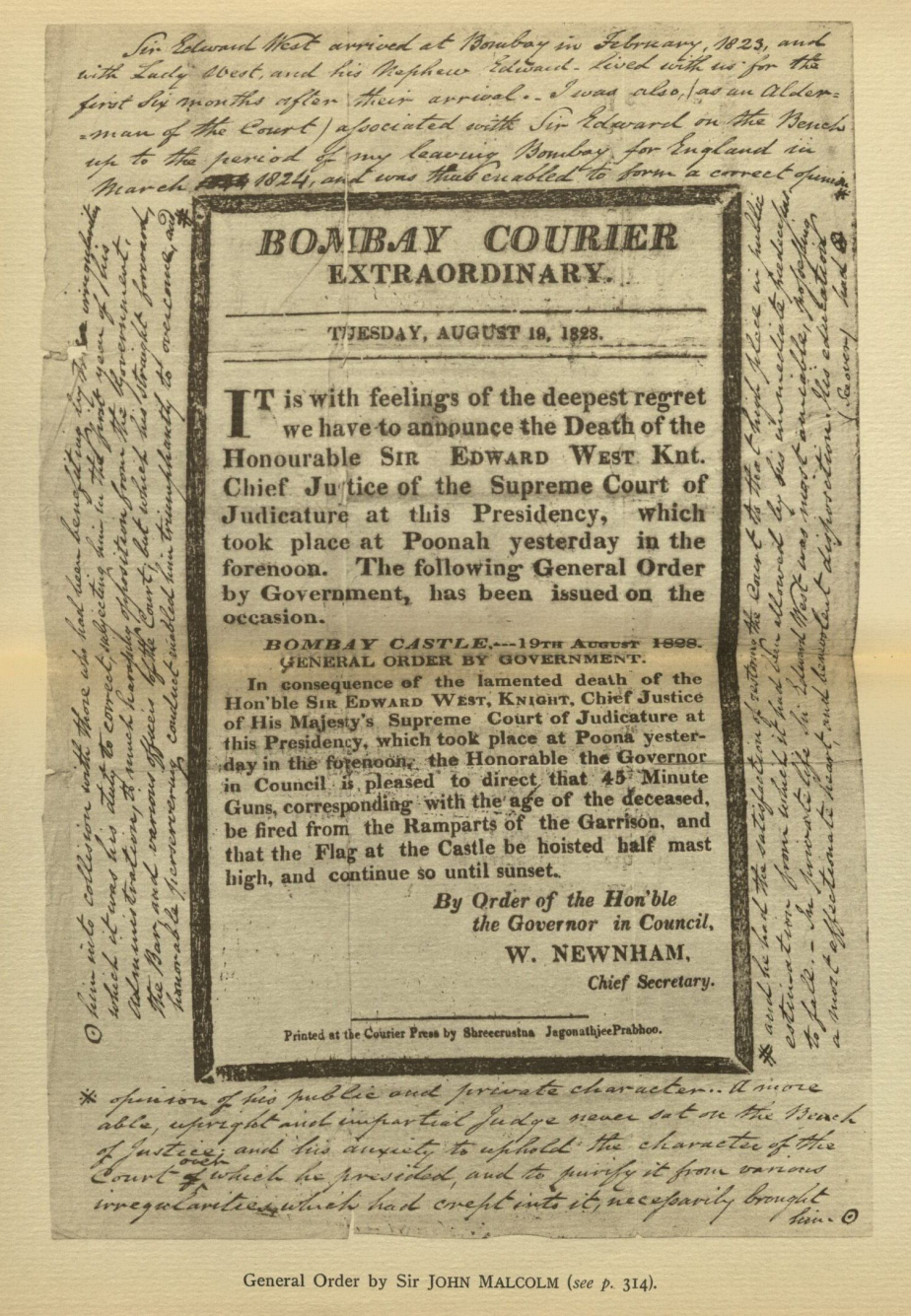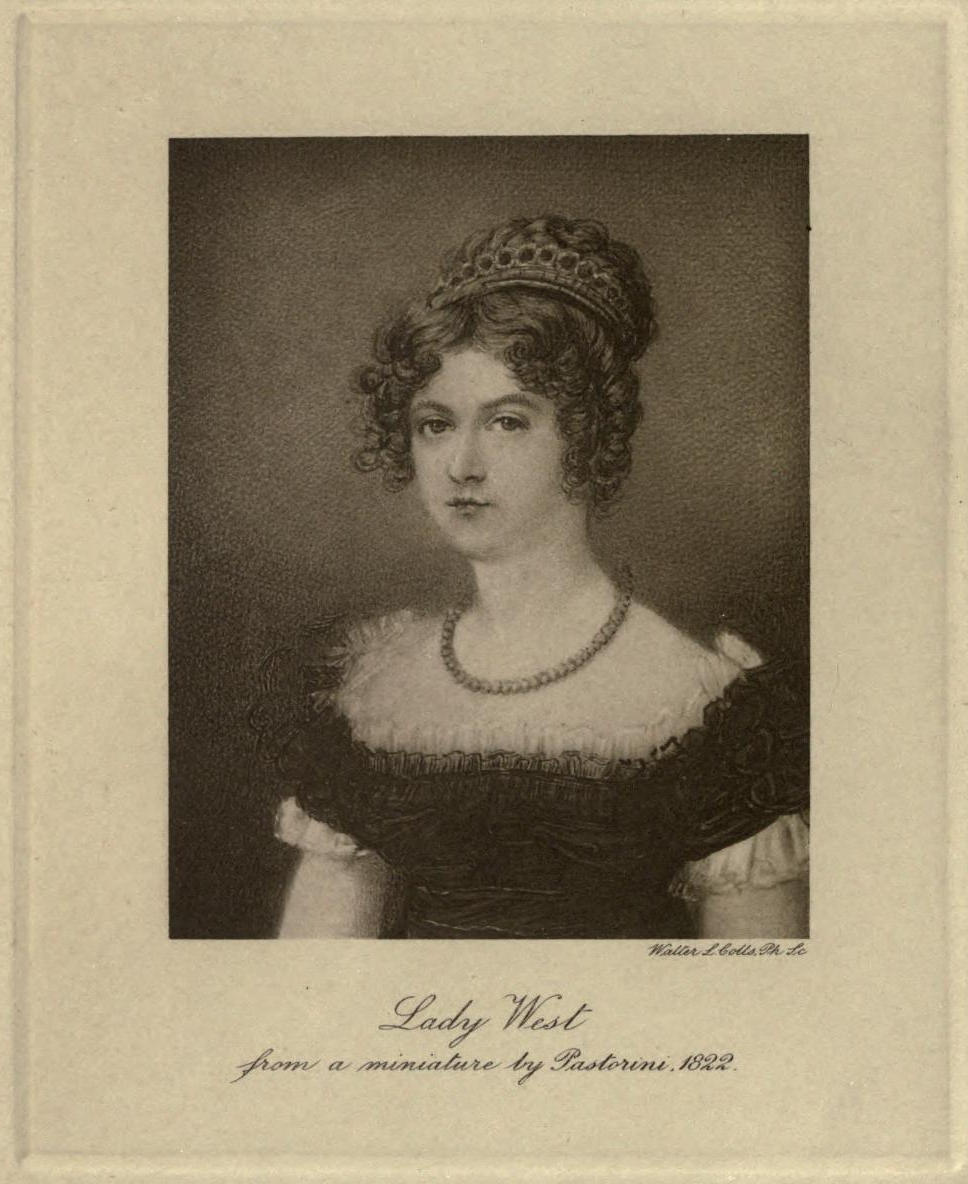Edward West on:
[Wikipedia]
[Google]
[Amazon]
Sir Edward West (1782 – 18 August 1828) was a British judge who served in India and an economist. He is famous for his statement of the law of diminishing returns in his ''Essay on the Application of Capital to Land'' (1815, p. 2): "The principle is simply this, that in the progress of the improvement of cultivation the raising of rude produce becomes progressively more expensive, or, in other words, the ratio of the net produce of land to its gross produce is constantly diminishing." (The gross produce means the value of total output and the net is the gross minus the cost of production and exclusive of profit and rent.)
Edward was born in 1782 (baptized 5 April 1782) to John Balchen West, Receiver General for  Edward West married Lucretia ffolkes, daughter of his guardian uncle, on 26 August 1822 at
Edward West married Lucretia ffolkes, daughter of his guardian uncle, on 26 August 1822 at  West and Lucretia had a daughter Fanny Anna in 1826. West died at Poona where he was buried. Lucretia died during the birth of her second child (the infant son also died) in 1828, shortly after the death of her husband. A scholarship was started in Bombay by the citizens in his honour.
West and Lucretia had a daughter Fanny Anna in 1826. West died at Poona where he was buried. Lucretia died during the birth of her second child (the infant son also died) in 1828, shortly after the death of her husband. A scholarship was started in Bombay by the citizens in his honour.
West on encyclopedia.com
{{DEFAULTSORT:West, Edward British economists 1782 births 1828 deaths Judges of the Bombay High Court People educated at Harrow School Alumni of University College, Oxford
Hertfordshire
Hertfordshire ( or ; often abbreviated Herts) is one of the home counties in southern England. It borders Bedfordshire and Cambridgeshire to the north, Essex to the east, Greater London to the south, and Buckinghamshire to the west. For govern ...
. His parents died when he was still very young and Edward was brought up by an uncle, Sir Martin Browne Ffolkes, FRS at Hillington Hall near King's Lynn
King's Lynn, known until 1537 as Bishop's Lynn and colloquially as Lynn, is a port and market town in the borough of King's Lynn and West Norfolk in the county of Norfolk, England. It is located north of London, north-east of Peterborough, no ...
. Edward's sister Frances later married Captain Lane of the 47th Regiment of Foot. West studied at Harrow and then at University College, Oxford
University College (in full The College of the Great Hall of the University of Oxford, colloquially referred to as "Univ") is a constituent college of the University of Oxford in England. It has a claim to being the oldest college of the univer ...
. He graduated first class and was distinguished in the classics and mathematics. In 1814 he was called to the Bar at the Inner Temple
The Honourable Society of the Inner Temple, commonly known as the Inner Temple, is one of the four Inns of Court and is a professional associations for barristers and judges. To be called to the Bar and practise as a barrister in England and Wal ...
.
In 1815 he wrote an essay arguing against the "impolicy of any great restriction on the importation of corn" which was appreciated by the economist David Ricardo
David Ricardo (18 April 1772 – 11 September 1823) was a British Political economy, political economist. He was one of the most influential of the Classical economics, classical economists along with Thomas Robert Malthus, Thomas Malthus, Ad ...
. In 1825 he wrote a pamphlet on the "''Price of Corn and Wages of Labour''" in which he expressed what is now known as the law of diminishing returns. This little known essay was reprinted in 1903 by Johns Hopkins University
Johns Hopkins University (Johns Hopkins, Hopkins, or JHU) is a private university, private research university in Baltimore, Maryland. Founded in 1876, Johns Hopkins is the oldest research university in the United States and in the western hem ...
with a preface by Dr Jacob Hollander
Jacob Harry Hollander (1871–1940) was an American economist.
Biography
Hollander was born in Baltimore, Maryland. He graduated from Johns Hopkins University with a BA in 1891, and a PhD in 1894. He became associate professor of finance there. ...
.
 Edward West married Lucretia ffolkes, daughter of his guardian uncle, on 26 August 1822 at
Edward West married Lucretia ffolkes, daughter of his guardian uncle, on 26 August 1822 at Marylebone Church
St Marylebone Parish Church is an Anglican church on the Marylebone Road in London. It was built to the designs of Thomas Hardwick in 1813–17. The present site is the third used by the parish for its church. The first was further south, near Ox ...
. West was appointed Recorder of the King's Court of Bombay
Mumbai (, ; also known as Bombay — the official name until 1995) is the capital city of the Indian state of Maharashtra and the ''de facto'' financial centre of India. According to the United Nations, as of 2018, Mumbai is the second- ...
and knighted in the same year. The couple reached Bombay on 1 February 1823. He became Chief Justice on 8 May 1823. He chose to enforce order leading to being seen unfavourably by many officers in the employment of the East India Company
The East India Company (EIC) was an English, and later British, joint-stock company founded in 1600 and dissolved in 1874. It was formed to trade in the Indian Ocean region, initially with the East Indies (the Indian subcontinent and Southea ...
. He suspended several barristers and dismissed some officers, notably William Erskine, Master in Equity, suspected of improbity (mostly taking bribes in cases). Mountstuart Elphinstone and some other Europeans went on the side of Erskine. Erskine's position was taken by Fenwick, a nephew of West. George Norton
Lieutenant-General Sir George Pemberton Ross Norton is a retired British Army officer. He was the UK Military Representative to NATO. He is now Commandant of the Royal College of Defence Studies.
Military career
After being educated at Radle ...
, a recently appointed Advocate General for Bombay introduced fees that were seven times that received in England. Norton and West clashed on this order.
 West and Lucretia had a daughter Fanny Anna in 1826. West died at Poona where he was buried. Lucretia died during the birth of her second child (the infant son also died) in 1828, shortly after the death of her husband. A scholarship was started in Bombay by the citizens in his honour.
West and Lucretia had a daughter Fanny Anna in 1826. West died at Poona where he was buried. Lucretia died during the birth of her second child (the infant son also died) in 1828, shortly after the death of her husband. A scholarship was started in Bombay by the citizens in his honour.
References
External links
West on encyclopedia.com
{{DEFAULTSORT:West, Edward British economists 1782 births 1828 deaths Judges of the Bombay High Court People educated at Harrow School Alumni of University College, Oxford